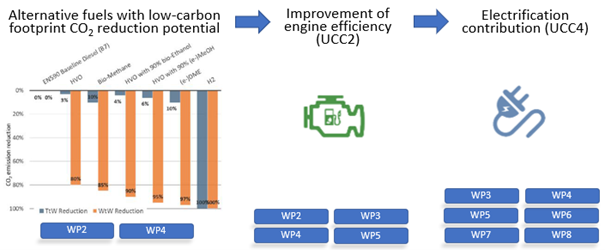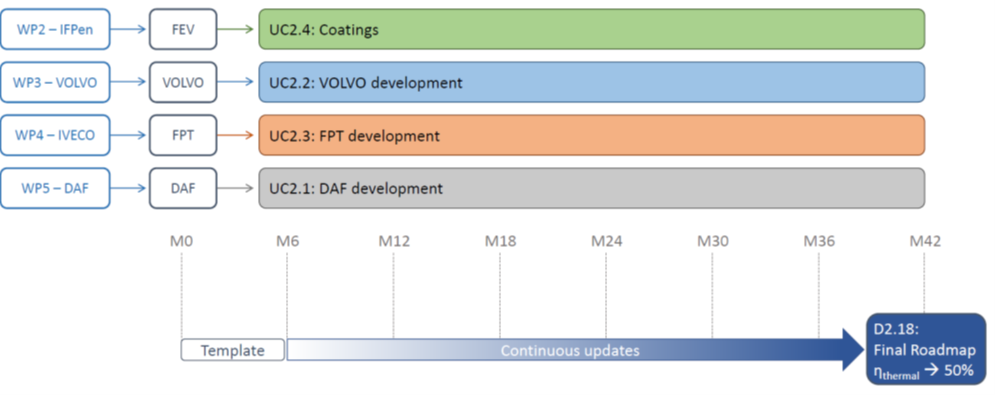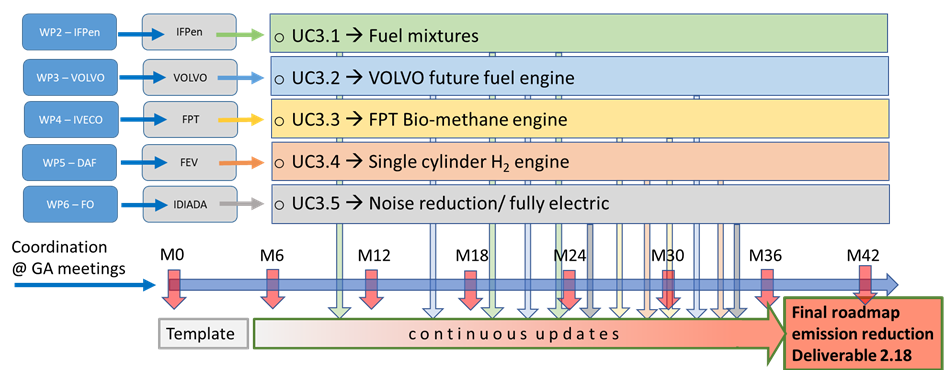Draft Roadmaps
The LONGRUN innovations are grouped into use cases in order to guarantee the expected impacts. In total, 22 use cases are defined which are thematically grouped into four use case clusters.
The use case clusters develop thematic roadmaps:
UCC1 – CO2 EMISSION REDUCTION ROADMAP (IFPEN)
The UCC1 aims to assess the impact of the different technical approaches (fuels & technologies) on the CO2 emission reduction, and so feed the related roadmap.
UCC1 has 6 use cases (also pictured below) of which four on advanced sustainable fuels, with low-carbon footprint on both the production level well-to-wheel (WtW effect), and carbon-content level tank-to-wheel (TtW effect): HVO, H2, fuel mixtures and bio-methane. Each of them targets to show the best possible TtW CO2 reduction and furthermore targets toward a WtW CO2 reduction of >80%. The last two use cases are the collection of CO2 emission reduction provided by the increased ICE thermal efficiency (UCC2) and powertrain electrification (UCC4).
Hybridization and electrification and engine efficiency will contribute through UCC2 and 4 and will be added to show the maximum CO2 emission reduction to be achieved. This will be enable by means of performing an evaluation of the energy efficiency improvements and CO2-reduction potential of 6 demonstrator vehicles that will be developed in the LONGRUN project.
All together these use cases will contribute to the overall CO2 emission reduction target.
Most of the first UCC outcomes will be available at the end of 2021 or early 2022.
UCC2 – Thermal Efficiency Pathways ROADMAP (FEV)
UCC2 deals with different investigations to increase the ICE BTE towards 50 % in LONGRUN. The basis for the development of a roadmap are four use cases which deal with engine optimization as well as thermal insulation topics such as:
- Advanced combustion concepts for diesel engines considering increased compression ratio and peak cylinder pressure, optimized piston bowl and fuel injection strategies
- Advanced air supply management by highly efficient turbocharging supported with optimal valve timings and valve lift system for Miller cycle
- Improved combustion concept for stoichiometric natural gas (NG) engine by increased in-cylinder turbulent kinetic energy, passive pre-chamber ignition system in combination with advanced reduction knock sensitivity (HP- and LP-EGR, water injection, non-conventional cam shaft profiles with late intake valve closing)
- Innovations and adaptations needed to enable the usage of the most promising future renewable fuels
UCC3 Emission reduction ROADMAP (AVL)
UCC3 deals with various approaches for emissions reduction in LONGRUN. The basis for the development of a roadmap are five use cases which deal with emission related topics such as:
- Advanced combustion concepts for diesel engines with conventional diesel fuel, liquid alternative fuels and blends of conventional and alternative fuels.
- Advanced combustion concepts for natural gas, bio-methane and hydrogen
- Advanced exhaust aftertreatment systems for diesel engines running on conventional diesel fuel and (liquid) alternative fuels and fuel blends
- Advanced exhaust aftertreatment systems for stoichiometric gas engines running on natural gas and bio-methane
- Noise reduction when driving in fully electric mode
Even though it is not a defined use case, the effect of electrification on emission reduction will be assessed.
UCC4 Total energy savings 10% through electrification ROADMAP (IDIADA)
UCC4 deals with various approaches and different technical solutions for the electrification or hybridization of the powertrain and drivelines of long-haul trucks and coaches, by means of performing an evaluation of the energy efficiency improvements and CO2-reduction potential of the 6 demonstrator vehicles that will be developed in the LONGRUN project.
Different levels of electrification (48V, full hybrid HEV and plug-in hybrid PHEV) and different hybrid drivelines and innovative solutions (e-axle, e-transmission, e-turbo, smart auxiliaries, waste heat recovery) are investigated, by analyzing the potential benefits of the technical developments applied to each demonstrator, as well as the additional improvements related to advanced connected control strategies and predictive maintenance.
The basis for the development of a roadmap for electrification technologies in HD applications, are seven use cases which deal with topics related to hybrid vehicles and advanced connected strategies:



